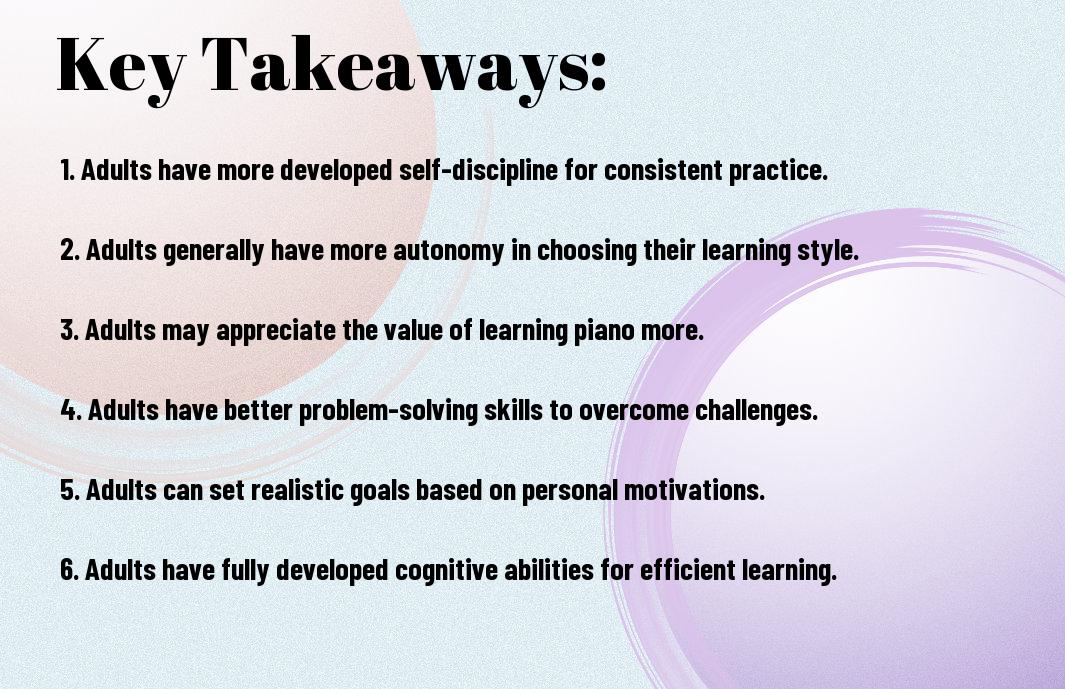You might have wondered if it’s too late to start learning the piano as an adult, but fret not – there are advantages to picking up this musical skill later in life. While children might have more flexibility in their learning abilities, as an adult, you bring a wealth of life experience, discipline, and motivation to your piano practice. In this blog post, we will explore the unique benefits and advantages that adult learners have when it comes to mastering the piano.
Key Takeaways:
- Increased Discipline: Adults often have better time management skills, discipline, and self-motivation, which can aid in consistent practice and faster skill development in learning piano.
- Deeper Understanding: Adults have the advantage of maturity and life experiences, allowing them to better connect emotionally with the music they are playing, leading to a deeper understanding and interpretation of compositions.
- Motivation: Adults usually have a clearer goal or reason for learning piano, whether it be for personal enjoyment, stress relief, or self-improvement, which can provide stronger motivation to persist through challenges and setbacks.
The Myth of the “Critical Period”
Debunking the idea that children are better at learning piano
Period. You may have heard the notion that children have a “critical period” during which they can learn new skills more easily than adults. This idea has been perpetuated in discussions about learning music, including piano. However, research has shown that the belief in a rigid critical period for learning music is unfounded. In fact, adults have many advantages when it comes to learning the piano compared to children.
The role of neuroplasticity in adult learning
Role. One of the key advantages adults have when learning the piano is their ability to leverage neuroplasticity. Neuroplasticity refers to the brain’s capacity to reorganize itself by forming new neural connections in response to learning and experience. As an adult learning the piano, your brain is capable of adapting to new information, motor skills, and auditory stimuli with much flexibility.
Neuroplasticity allows you to make connections between different areas of the brain more efficiently, aiding in the acquisition of complex piano skills. This means that although children may have a head start in terms of time spent practicing, your adult brain is adept at making progress and improving rapidly once you dedicate yourself to learning the piano.
Flexibility and Motivation
Adults’ ability to set goals and prioritize practice
Any piano student knows that practice is key to improvement. As an adult learner, you have the advantage of being able to set specific goals and prioritize your practice sessions according to your schedule. Unlike children who may struggle with time management and have other commitments like school, as an adult, you have the autonomy to decide when and how long you can practice each day. This level of flexibility allows you to tailor your piano learning journey to suit your lifestyle and goals.
The power of intrinsic motivation in adult learners
Motivation is a significant factor in learning any new skill, including playing the piano. As an adult, your motivation to learn the piano is likely to be more intrinsic rather than extrinsic. You are learning for yourself, for the joy of music, or as a form of self-expression, rather than because your parents or teachers expect you to. This intrinsic motivation can drive you to practice regularly, overcome challenges, and persist in your learning journey, ultimately leading to a more fulfilling musical experience.
To further enhance your intrinsic motivation as an adult learner, you can set meaningful goals, such as mastering a particular piece you’ve always admired or playing at a local event. By connecting your piano practice to personal aspirations and emotional rewards, you can maintain a high level of motivation and enthusiasm for learning, making the process more enjoyable and satisfying.
Cognitive Advantages
Once again, learning the piano as an adult can offer you several cognitive advantages compared to learning as a child. These advantages can have a significant impact on your cognitive abilities and daily life.
Improved memory and concentration in adults
Cognitive benefits of learning the piano as an adult include improved memory and concentration. When you learn to play an instrument like the piano, you are not only training your fingers but also your brain. The processes involved in reading music, translating the notes into hand movements, and coordinating both hands require intense focus and concentration. As an adult, you have the advantage of matured cognitive abilities, allowing you to grasp complex musical concepts more easily and enhance your memory retention.
Enhanced problem-solving skills through piano learning
With the challenges that learning to play the piano presents, you have the opportunity to enhance your problem-solving skills. As an adult, you can approach the complexities of piano playing with a different mindset than a child. Your life experiences and developed cognitive abilities enable you to tackle musical obstacles in creative ways, finding solutions more efficiently and effectively.
This mental agility gained through piano learning can extend beyond the music realm and into various aspects of your life. The problem-solving skills you cultivate while learning the piano as an adult can help you navigate challenges in your career, relationships, and personal endeavors with a sharper and more adaptable mind.
Emotional Benefits
Stress relief and anxiety reduction through music-making
All you need to do is sit down at the piano and play, and you’ll feel the stress melt away. As an adult, you may find that the pressures of daily life can become overwhelming at times. Learning to play the piano can serve as a therapeutic outlet, allowing you to channel your emotions and focus your mind on the music. The act of creating beautiful sounds can soothe your soul and provide a welcome escape from the chaos of the outside world.
Building confidence and self-esteem through piano playing
Any doubts you may have about your abilities can be shattered with each note you master on the piano. As you progress in your musical journey, you’ll start to believe in yourself more, both as a pianist and as a person. The sense of accomplishment that comes from learning a new piece or mastering a challenging technique can boost your self-esteem and give you the confidence to tackle other areas of your life with a newfound sense of purpose.
Through consistent practice and dedication to improving your piano skills, you’ll notice a positive change in how you view yourself and your abilities. The sense of achievement that comes from overcoming obstacles in your musical journey will spill over into other aspects of your life, helping you build a strong foundation of confidence and self-assurance.

Social Advantages
Many adults find that learning to play the piano provides them with unique social advantages that may not have been as accessible during their childhood years.
Opportunities for social connections and community building
One of the advantages of learning piano as an adult is the opportunity it presents for social connections and community building. As you launch on your piano journey, you may join group classes, attend recitals, or participate in piano ensembles. These activities not only allow you to meet like-minded individuals who share your passion for music but also provide a sense of community and support as you progress in your musical skills.
The joy of sharing music with others
Social connections can be enhanced through music, and the piano offers a perfect avenue for this. When you learn to play the piano as an adult, you have the opportunity to share your musical talents with others in various settings. Whether you play for family gatherings, participate in jam sessions with friends, or perform at local events, sharing your music can bring joy not only to yourself but also to those around you.
One of the joys of sharing music with others is the ability to connect on a deeper level through a universal language that transcends words. Music has the power to evoke emotions, create memories, and spark meaningful interactions with those you share it with.

Learning Styles and Approaches
Unlike Is it better to learn piano at young age?, as an adult, you may find certain advantages when it comes to learning styles and approaches. One advantage is that you have a better understanding of how you learn best. You have likely gained insights into what methods work for you in other areas of your life, allowing you to apply these strategies to your piano learning journey.
Tailoring instruction to adult learning styles
One way to benefit from your adult learning style is to tailor your piano instruction to suit your individual preferences. You may find that you prefer a more self-directed approach to learning, where you have the freedom to explore different techniques and pieces at your own pace. Additionally, as an adult, you have the ability to set specific goals for your piano playing and work towards achieving them in a structured manner.
Exploring different genres and repertoire options
For options, as an adult learner, you have the freedom to explore a wide range of genres and repertoire options that appeal to your personal taste. Whether you are interested in classical music, jazz, pop, or any other genre, you can choose pieces that resonate with you and keep you motivated to practice. This flexibility allows you to make your piano learning experience more enjoyable and fulfilling, as you can focus on playing the music that truly inspires you.

Summing up
The advantages of learning piano as an adult compared to learning as a child lie in your ability to grasp complex concepts quicker due to your mature cognitive abilities. Your adult perspective allows you to appreciate the value of discipline and practice, leading to more focused and efficient learning. Additionally, your passion and commitment to learning the piano as an adult can drive you to set clear goals and milestones, making your progression more intentional and rewarding.
The journey of learning the piano as an adult is a unique and fulfilling experience that offers advantages such as increased cognitive abilities, a deeper understanding of the learning process, and a heightened sense of determination and drive. Embrace the challenges and joys of learning the piano at any age, and enjoy the enriching journey of mastering this timeless instrument.
Q: Is it possible to learn piano as an adult?
A: Yes, it is definitely possible to learn piano as an adult. While it may take more time and effort compared to learning as a child, adults can still make significant progress and achieve proficiency with dedication and practice.
Q: Are there any advantages to learning piano as an adult?
A: One advantage of learning piano as an adult is that adults generally have better focus and discipline, which can aid in consistent practice and progress. Adults also often have a deeper appreciation for music, which can enhance the learning experience.
Q: How can adult piano learners overcome challenges?
A: Adult piano learners can overcome challenges by setting realistic goals, being patient with themselves, and seeking guidance from a qualified piano teacher. Consistent practice, breaking down complex pieces into smaller parts, and staying motivated can also help in overcoming obstacles.


